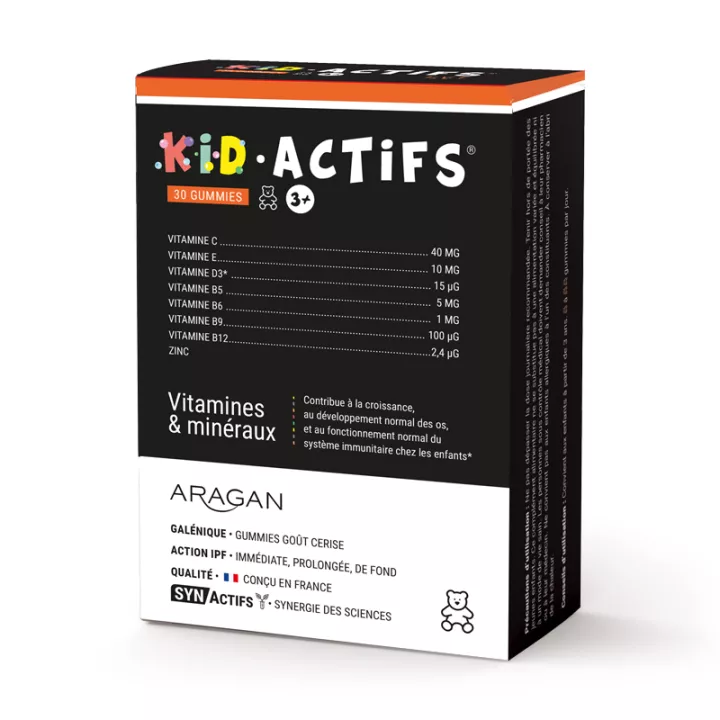
SYNACTIFS KIDACTIFS 30 capsules in our pharmacy bio Comment on the advice of use and dosage of SYNACTIFS KIDACTIFS 30 capsules with our Verified Reviews partner after your purchase.
1 capsule per day.
Comment on the advice of use and dosage of SYNACTIFS KIDACTIFS 30 capsules with our partner Avis checked after your purchase.
For 1 capsule:
- It is recommended to follow recommended doses
- Keep out of reach of children
- This dietary supplement does not replace a varied and balanced diet or a healthy lifestyle
- People under medical supervision should seek advice from their pharmacist or their doctor
- Not suitable for children allergic to any component
Box of 30 capsules.
Calcium is a mineral salt, the most abundant in the body. But it is not manufactured by the body. We must make daily through diet. It is more than 99% contained in the skeleton as calcium sulphate which gives bones and teeth their strength and rigidity. The remaining 1% is present in the blood and in the extracellular fluid, and has many more functions: it contributes to teeth and normal frames, and it is necessary for growth and to children of normal bone development .
Copper is a trace element that is involved in many biochemical reactions in cells because it is essential for many enzymes. He acts in the formation and maintenance of connective tissue. It is found in most foods. The bisglycinate shape allows maximum absorption in the body.
Iron is an essential trace element very present in hemoglobin and muscle cells. It comes into account in reducing fatigue. It is very present in the diet and in particular it is found in oysters, spinach, beans, or pork or lamb. Nevertheless, its absorption is low depending on the type of food consumed (30% to 1%).
Obtained after evaporation of sea water, marine magnesium is a concentrate of 55% elemental magnesium. It is an assimilable form between 50 and 60% against 20-30% for synthetic magnesium. Magnesium participates in over 300 enzymatic reactions essential to the maintenance of energy balance, nervous, muscular and psychological as well as reducing fatigue.
Manganese is an essential trace element for the organism, present in all plant foods. It contributes to normal energy metabolism and is involved in the normal formation of connective tissue and maintaining the framework. Our diet should provide us manganese daily, because more than a third of our reserves are replenished daily. The bisglycinate shape allows maximum absorption in the body.
Potassium is an essential mineral that performs several vital functions in the body. Such as sodium and chlorine, which is an electrolyte. It works closely with sodium to maintain acid-base balance of the body and the fluid. It controls the fluid levels and the pH inside cells, while sodium is the same on the outside of cells. It contributes to the normal functioning of the nervous system, normal muscle function, normal blood pressure.
Selenium is a trace element present in most foods, but they are nuts (especially Brazil nuts), fish and seafood, offal (kidney, liver) and meat that are the best sources. It can not be synthesized by the body, so it must be provided by food.
Vitamin A is a fat soluble vitamin which is called retinol. It is so called because it is in the retina that researchers have isolated for the first time. But vitamin A is also present in bones, mucous membranes and in the liver. Just not in the same form. Foods from animals are the first source of supply of vitamin A to the body. At the agency level, it contributes to maintenance of normal skin and other body functions.
Vitamin B1 or thiamine is a non-caloric organic substance essential to our metabolism and not produced by our body. It is involved in the conversion of glucose to energy in the metabolism of amino acids. It contributes to normal psychological functions to a normal energy metabolism, normal heart function, and normal functioning of the nervous system.
Vitamin B12, also called cobalamin, is a water soluble vitamin essential to the normal functioning of the nervous system to normal psychological functions and helps reduce fatigue.
Vitamin B12, also called cobalamin, is a water soluble vitamin essential to the normal functioning of the nervous system to normal psychological functions and helps reduce fatigue.
Vitamin B3 is a water soluble vitamin very little stored by the body, thus requiring to bring daily through diet. Vitamin B3 helps reduce fatigue, normal energy metabolism, normal psychological functions and the maintenance of normal skin.
Vitamin B5, also known as pantothenic acid is a water soluble vitamin sensitive to heat. It is almost not stored by the body and must be made to the body on a daily basis.
Vitamin B6 is a water soluble vitamin often associated with magnesium, which improves the action in maintaining energy balance, nervous, muscular and psychological and reducing fatigue.
Vitamin B8 is a water soluble vitamin, also known as vitamin H or Biotin. It is produced by the body in large quantities, but it is recommended to have a daily intake. It must therefore be made daily through diet. It helps maintain normal hair.
Vitamin B9 is a water soluble vitamin, also known as vitamin H or folic acid. This vitamin is partly synthesized by the body, but in insufficient quantities, so it must be consumed every day.
